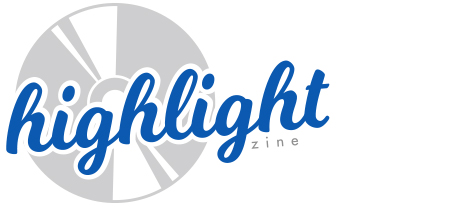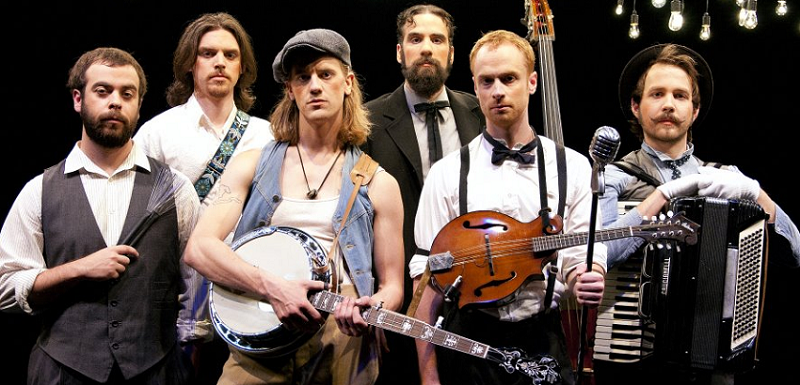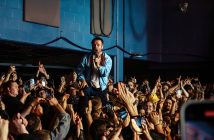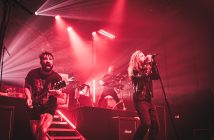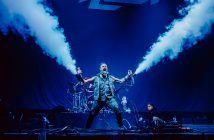The Hollows
Austin, TX // SXSW
Interview by Jordan Fischels
Is this your first time playing SXSW? How has it been?
Yes it is. It’s been fantastic. It’s a little overwhelming. There’s so much music and it’s almost hard to focus on any one band. You’re just walking in the street and there’s music hitting you from like every angle. It’s a bit of a sensory overload, but it’s great!
How does it compare to other festivals or shows you guys have played?
The only other festival we’ve done really is CMJ in New York, which we’ve done twice. It’s kind of our home turf, and it’s also just a lot less hectic because we’re a little more used to it. But the actual shows themselves are pretty much the same! I mean once we get on stage the show is just about having a great time and having great people along for the ride.
So you guys are from Brooklyn; how did you all meet?
[Daniel] Well Erik, Jeff, myself and Dave all went to school together studying theater, and then we all moved to New York at different times. We didn’t really play music together though, maybe just picking up a guitar here and there. But then Rob and I met doing this show in Connecticut, and we sort of bonded over our love of like Neil Young and Bob Dylan. So we started playing together back in the city, then Dave started playing with us, and then Kurtze, and then Erik, then about a year and a half ago Justin joined the group as our official drummer. And that’s sort of how the whole thing got started. It kind of started and just a fun thing to do, and the more and more shows we played the more and more serious it got. Now here we are at SXSW!
What interested you in the sort of indie roots/folkabilly genre? Who are some of your influences and what has helped formed you guys?
[Erik] It’s kind of the most common denominator with all of us in terms of what we listen to. A lot of like 60s and 70s inspired folk rock because its narrative story telling, and that really turns us on. In a lot of like temporary stuff or pop stuff, the lyrics don’t take precedent. Since most of us have a theatre background, we’re all story tellers. I think this is just like the easiest medium for all of us to be able to take charge of the stories we want to tell, as apposed to subjecting ourselves to the mercy of the theater industry in New York. I mean I think all of us still have our hat in that ring one way or another, and you know this is just what we’re doing now. Who knows what it’ll be in the future. We’re all really good friends first and foremost as apposed to like really talented, chapped musicians who are just collaborating in that way.
[Rob] Also, as actors, we’re drawn to characters and I think that, as Erik said, in contemporary pop music you don’t necessarily see a lot of character stuff. The speaker of the song is sort of just the person singing the song, and I find that in folk music, blue grass music, and especially country music you have a lot of very specific narrators that maybe aren’t the person who is necessarily writing the song. It’s written from someone else’s perspective, and I think that’s an interesting narrative device that we’re all drawn to as actors and also as story tellers.
I hear you guys just launched a fundraiser for your debut LP, Belong To The Land – can you tell us a bit about it?
It was great. This was about two and a half years ago now. We did a fundraiser for our first LP for production, recording and stuff. We tried to raise $6,000, and we ended up with a little over $9,000. It was amazing. We used that to rent a great studio, we had a bunch of CDs printed, a bunch of merchandise, everything we needed to sort of put our stamp on things and get ourselves on the map and just like open up a whole lot more opportunities for us. It never would have happened without all of our friends and family just like pitching in. So, we’re actually in the midst of another fundraiser right now, two and a half years later, for the next studio album, which was kind of a tough decision because its always hard to sort of get over the initial hump of like asking people for money. I know, especially with the first one, a lot of people that had been supporting us for the two years that we were a band before we had released an album were really excited to have us get our product out there. And for this one, the reason that we decided to ask again was because, while we don’t really need anymore help, like getting shows out there, at least in New York, and making more music–like the next album is going to be self-funded. This new fundraiser is more about distribution, publicity, national press, touring, radio, all that stuff. We’re sort of casting the net a little bit wider, and that’s where we still need help I think.
I know you were in a production of Avenue Q! How different is it to perform on Broadway compared to playing your own music?
[Rob] I think there’s definitely an overlap in terms of having your receptors open for whatever energy the audience has. I mean as a performer, I think you have to go out and do your job regardless of what the audience is giving you, but you also want to be open to whatever energy they’re bringing because that’s why people go to see live shows, because it’s a dialogue. It’s not just popping on a CD or watching a movie; the audience will change the show. So I think that’s definitely an overlap in live music. I think, also, there’s a similarity in terms of how we work as a band where we don’t have a front man, where we don’t have one lead singer. We have 5 or 6 lead singers and front men. That process comes from a lot of listening, a lot of paying attention to each other, a lot of like knowing when to “pass the ball” of energy, and give and take. And I don’t think that necessarily we would have known how to do that without theater training, without ensemble training.
[Daniel] It’s often that we don’t really think of ourselves as a band so much as an ensemble, or like a collective. It’s formed by like a message or a goal or like-mindedness, and how do we work together to communicate our message. We have this saying, everyone in New York, and our fan-base in particular, we have a saying which is, “Together, together.” We’re all in this together. It’s not only about like going to see this band, it’s about having an experience where everyone is collectively celebrating in the ideas that we’re trying to promote. And I think that’s why if you come to a live show, you’re not going to get any one genre, you’re going to get blue grass, you’re going to get country, you’re going to get southern rock, and you’re going to get some weird stuff that we don’t even know like what it is half the time. So if you come to one of our shows, you may not be in to this, but you’re probably going to love this, and then hopefully you’ll find some middle-grounds with something else, or like share a connection with us or the person next to you. And that’s actually why this fundraiser was so important, because it really is about needing funds to help spread our message and to make the family bigger. And I mean, life is short. We talk about life, we talk about death, and we talk about the things that matter most to us, which is just a strong sense of community. None of us ever really set out with an aspiration to become like big music stars, we’ve never been driven by fame or fortune. We’re driven by the love we have for each other and the possibility that we could make people happy and cultivate and spread good will.
What has been the “Highlight” of your career? Personally and collectively.
There’s so many! [Laughs.] [Rob] I feel like the ladder keeps extending. I remember when we played our first show with 5 people, and then when we played a show where there were like 30 people it was really cool. And then we played a show with like 100 people there, and then that was really cool. And then a few hundred people, and then that was great. Whether it’s the venue, whether it’s releasing a record, or doing another music video, which we all sort of self-produce, with the help of our wonderful friends who are in the film and theater industry–I just think we keep setting goals and then as soon as you hit that, you set the next one. And just keep on going. We like to stay busy.
[Daniel] We have two music videos, one for a song called “August” and another one for a song called “Poor Eyes” and those were hatched by our imagination. We did all the art direction for them. Some of us took rolls as director, as lighting designer, as the actual constructor of the scenery, or the costumes. And we have so many amazing friends that were like so eager to help make this happen. That’s been so amazing. And in the other sense, we’ve been on the road now for like 10 days, and this is the first time we’ve been able to do that. The realization that making this music is affording us the opportunities to see the country and see places we’ve never been and meet so many incredible, beautiful strangers who have been so helpful and so accommodating. We’ve met so many awesome people, just so randomly, that have showed us incredible acts of kindness. And that’s just amazing.
